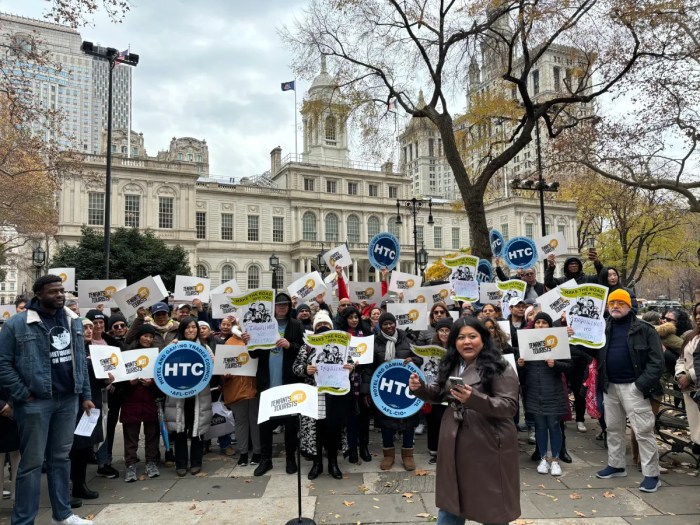By Naeisha Rose
President Stacey Eliuk of the Queens County Young Democrats held a panel discussion Jan. 12 with labor leaders on the Trump administration’s position on labor at the new Latin American Intercultural Alliance center in Jamaica.
They spoke about the importance of being educated about the issues surrounding labor, how labor unions are the first line of defense for many communities and what union members, representatives and supporters of labor unions can do to fight for workers rights in a Trump presidency.
“The future that we dream of is tenuous at best,” said Eliuk. “The person that Donald Trump wants to appoint as the secretary of labor (Andy Puzner, owner of fast food chain Carl’s Jr.) literally does not believe in the minimum wage. One of the people that works for him is a 47-year-old mother of two who for eight years still is making $8.75 an hour working the graveyard shift at one of his restaurants. We need to learn about the issues to protect workers.”
First on the panel to speak was the business agent for Steamfitters 638 union, Brian Wangerman.
“I’m here because to tell you the truth. I’m scared,” said Wangerman, a fourth-generation steamfitter. “I was 18 years old when I was accepted into the apprenticeship and adults came up to me and said that you are set for life and that’s not the case anymore.”
Wangerman has a recently married nephew who is a fifth-generation steamfitter whose future he worries about.
“I think that an organization like this, you really have to go out there,” said Wangerman. “It’s late for a lot of us [the older generation], but it is not late for you.”
Up next was Mike McGuire, the director of the Mason Tenders District Council PAC, a 19-year veteran.
“We don’t know where the country goes,” he said. “Presidential decorum has disappeared, the unpredictability of the president-elect is the scariest thing. We need to be able to predict what our political opponents are going to do so that we can strategize against them. That is our challenge.”
The third speaker was Alex Gleason, a policy associate for the New York City Central Labor Council, AFL-CIO.
“What needs to be taken out of here today is a real sense of urgency,” he said. “Harry Van Arsdale (late head of the electrical workers union) said on his deathbed ‘they are going to lose it all before they get anything back.’”
Gleason warns about the vulnerability of union in other states.
“Across the country, many states are becoming right-to-work havens, which devalues the power of labor unions and erodes the rights that union members and representatives fight for in terms of higher wages, overtime pay and safety at the workplace,” he said. “Without these agreements, workers have no bargaining clout.”
When asked about Hillary Clinton’s and the Democratic Party’s weak showing with labor unions, the panelist brought up Wall Street’s takeover of the political process.
“Corporations have taken over this country…we live in a proud unabashed meritocracy, there is no solidarity in a meritocracy, “ said Gleason. “That’s what gave the orange oligarch the ammo to convince the good hardworking people to vote for him. Until we go back to a Roosevelt program [the New Deal], it’s not going to change.”
Michele Gilliam, the deputy labor campaign manager for Clinton, also mentioned the lack of diversity and accountability that needs to be fixed in the Democratic Party.
“We have to have tough conversations with people that we sometimes on the surface don’t relate to and we can only do that if we are willing to engage others in a meaningful and respectful way,” said Gilliam, referring to members in her union who are conservative and NRA members, whom she still considers her “brothers,” no matter what.
Councilman I. Daneek Miller (D-St. Albans) spoke about the power of labor unions in New York City, which has the largest number of union members in the country at 1.3 million.
“The density of labor unions here dictates what happens in the country,” Miller said. “The threat of being organized and unions coming together forces employers to give us decent wages.”
He added, “There is a silver lining. If we continue to do what we do, more people will gravitate towards us.”


































